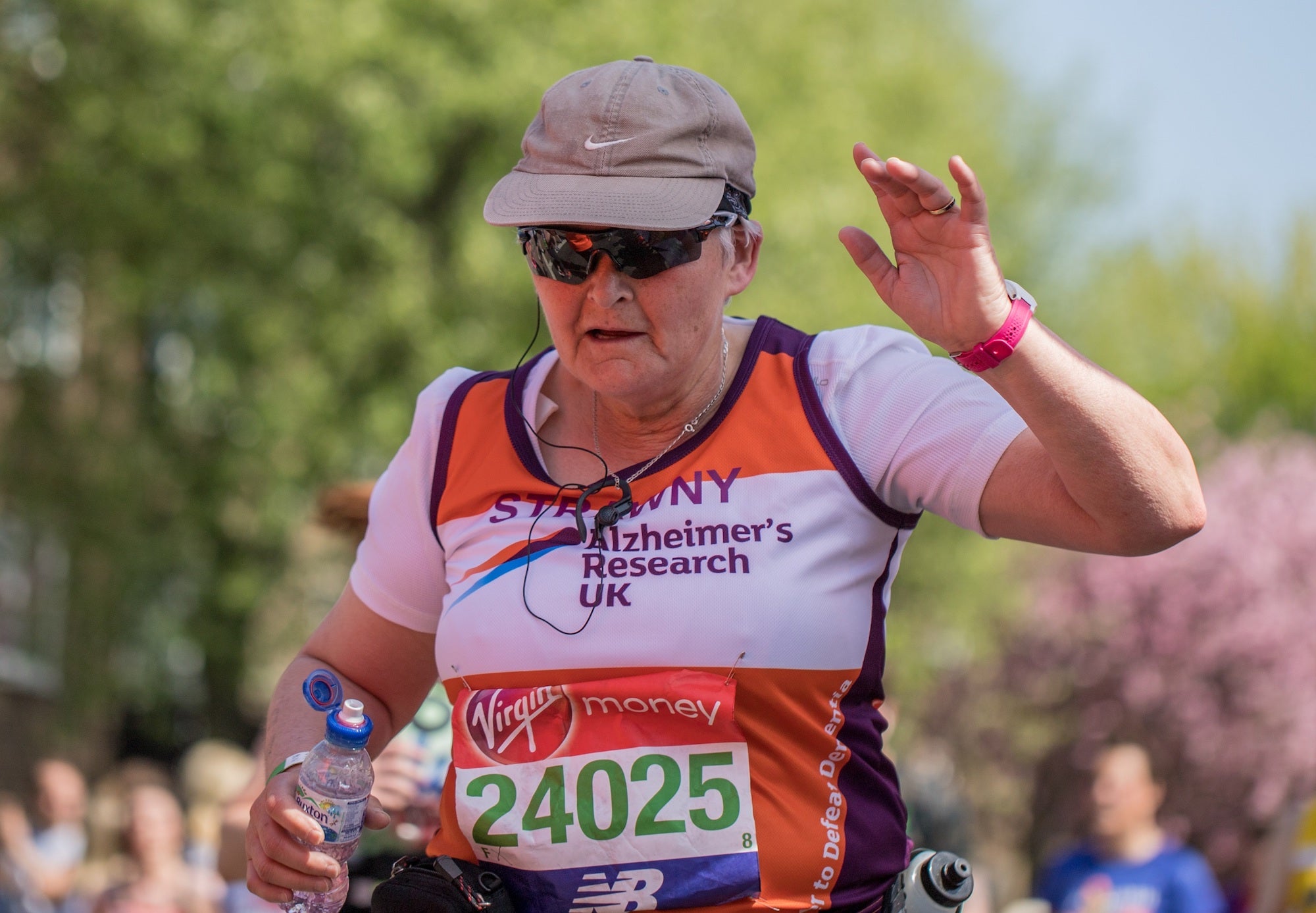These Athletes Embrace Running To Curb The Symptoms Of Dementia

Photo of Sue Strachan racing the 2018 London Marathon taken by Tim Parry and provided by Sue Strachan.
Running From Dementia
Along the graceful slopes of Lower Cape Cod, Greg O’Brien loved to run past vibrant gardens and moss-covered trees with perhaps an errant seagull overhead. It felt so good.
Suddenly, the running experience took a twist O’Brien wasn’t expecting. His short-term memory lapsed. He didn’t recognize people he had known for years. Rage and withdrawal were his immediate emotional responses—but it was the hallucinations common among Alzheimer’s patients that finally drove him inside.
“Alzheimer’s breaks your mind down and then it breaks your body down,” O’Brien explained. “Alzheimer’s is a lot different than what people think. It’s far more than memory loss. Running keeps me in the game a little longer.”
O’Brien, author of On Pluto: Inside the Mind of Alzheimer’s, was a professional journalist who wrote numerous articles for national and regional newspapers and magazines and continues working as a prolific writer. He regularly ran 10Ks before he was diagnosed with early-onset Alzheimer’s at 59. In the nine years since, he has continued to chronicle what it’s like to live with the disease.
“Running is good for your body and it’s good for your brain. Something happens in your brain and it lights you up,” he said. “It’s a natural high. I’m going to keep doing it until I just can’t.”
Alzheimer’s disease is perhaps the best-known form of dementia, but it’s certainly not the only one. Vascular dementia. Dementia with Lewy bodies. Frontotemporal dementia. The list goes on, with as many as 50 types currently recognized by doctors. Losing one’s memory is often upsetting and scary, but for people like O’Brien, running is the strongest way to fight it.
While exercise may not be a cure-all for cognitive impairment, others believe it makes a big difference. Sue Strachan was diagnosed with vascular dementia in her late 50s. Her physician suggested running as a way to slow the effects of dementia, particularly with her cardiovascular risk. She ran the London Marathon last spring at the age of 62 and, though she has no plans to run this year’s marathon, she has continued to run regularly every week. These days, she sticks close to home. “I usually just run very locally and am familiar with the routes I use,” she said. “I only got lost once and retraced my steps to a place I was familiar with, and I often run with friends.”
Carolyn Mastrangelo has a different reason for running: Her mother was diagnosed with early onset Alzheimer’s disease at the age of 55. She passed away in 2015. A runner and personal trainer who is now 50, Mastrangelo says she hopes she will not share her mother’s fate. “I would get very stressed anytime I forgot something. It would just send me into a panic,” she said. “Alzheimer’s leaves you with the feeling of helplessness and hopelessness. All you can do is sit around and wait. There aren’t even enough drugs or treatment for it.”
With plenty of races aimed at raising money for diseases like breast cancer, why not run one to raise money for Alzheimer’s, Mastrangelo wondered. The problem was, there weren’t any. The Alzheimer’s Association holds a walk every year, but not a race. So, Mastrangelo started her own, a 5K race and 2-mile fun run/ walk in New Jersey that she calls Running4Answers. This year marks the race’s 10th running and will be held on May 4.
“I feel running is essential for my health and my mental health. Studies show it’s good for your brain,” Mastrangelo explained. “I think more clearly. I sleep better. I even have better ideas while I’m on a run.”
There are a number of studies that show running—or any aerobic exercise, for that matter—is good for mental health. A 2017 study published in the Journal of Alzheimer’s Disease showed that moderate physical activity can slow the effects of dementia. A year earlier, another study published in Neurobiology Disease indicated that running later in life or even at the initial point of diagnosis can slow the effects of the disease.
“Exercise builds brain health. No single pill ever imagined could be as effective,” said Carl Cotman, Ph.D., founding director of the Institute of Brain Aging and Dementia at University of California Irvine. “The bio marker data is compelling. You can reverse the effects. Exercise changes brain metabolism and cell growth.”
Certain parts of your brain, like the hippocampus, shrink as we age, which can lead to impaired memory and possible dementia. Another study published in 2011 showed that exercise training “increased hippocampal volume by 2 percent, effectively reversing age-related loss in volume” by one to two years in older adults.
Director of the Cerebrovascular Laboratory at the Institute for Exercise and Environmental Medicine in Dallas Rong Zhang, Ph.D., agreed with Cotman that exercise and brain health go hand in hand. “You’re not going to stop aging, but in order to have a healthy brain as you get older, you need physical activity,” Zhang said. “Exercise has a wide spectrum of impact on the brain.”
Dementia is a devastating and debilitating disease—and anything that may slow its effects is worth a try. As Strachan puts it, it’s far better to be a role model for others than to be just another case study. “My mission while I am still able is to raise awareness,” she said. “To prove that it is possible to live well with a diagnosis of dementia.”